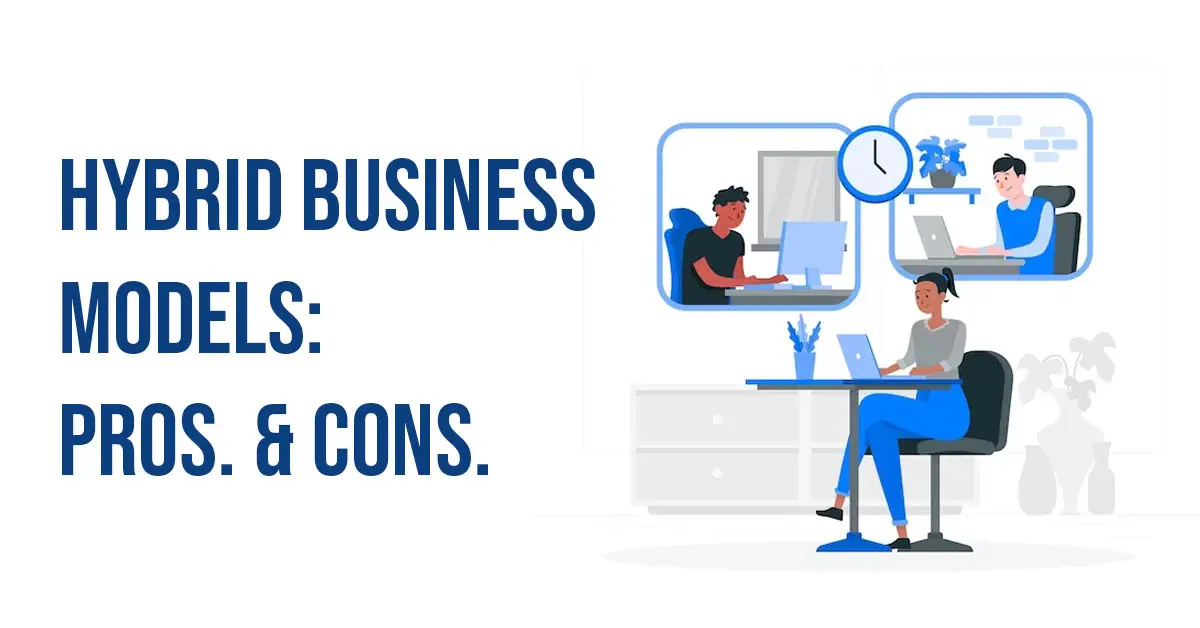Power of Hybrid Business Models: Pros and Cons Explored
The landscape of our professional world underwent a seismic shift during the global pandemic. While remote work became the norm during the outbreak, the aftermath saw the rise of a new trend – the hybrid work model. In this article, we delve into the advantages and disadvantages of adopting this innovative approach.
Understanding the Hybrid Business Model
Imagine the hybrid business model as a dynamic force in the business realm – a fusion of strategies working together seamlessly to create something extraordinary. In simple terms, it’s about embracing the best of both worlds, presenting a unique blend of advantages and disadvantages in the business setting.
Unveiling the Hybrid Business Model
- Flexibility RedefinedThe hybrid model introduces a flexible approach, allowing businesses to navigate challenges with a combination of in-office and remote strategies. This adaptability is a game-changer in the ever-evolving business landscape.
- Cost Efficiency Takes Center StageReduced operational costs emerge as a major advantage, as companies discover they don’t need expansive office spaces. This cost-saving fiesta extends to minimized expenses on snacks and casual office conversations, benefiting both employers and employees.
- Collaboration Without BoundariesThe hybrid model unleashes a collaboration wonderland. Through asynchronous communication and video calls, teams become a synchronized effort, breaking down physical barriers and fostering a cohesive work environment.
- Prioritizing Employee Well-beingThe hybrid approach promotes work-life integration, providing employees with the tools they need for remote work. From ergonomic furniture to regular check-ins, businesses strive to enhance employee satisfaction and well-being.
- Cultivating Company CultureContrary to concerns, the hybrid model can actually boost company culture. By empowering employees with schedule flexibility, companies create a positive atmosphere where remote and on-site work complement each other, contributing to a vibrant company culture.
Navigating the Challenges of Hybrid Work
- Impact on Customer ExperienceCertain businesses may face challenges, especially those reliant on in-person interactions. The absence of customer-facing employees can impact specialized services, requiring adaptation and technological solutions.
- Battling Employee IsolationAs employees focus on individual tasks away from the office, there’s a risk of diminished camaraderie and connection. Marginalized groups may face challenges in having their voices heard without the ease of spontaneous face-to-face discussions.
- Cybersecurity Risks on the RiseThe dispersed nature of remote work increases the vulnerability to cyber-attacks. Companies need to invest in robust cybersecurity measures, including constant updates, secure connections, and data recovery plans.
- Office Politics OverdriveMaintaining a democratic workplace becomes challenging, as power dynamics may favor those spending more time in the office. Striking a balance to avoid factionalism becomes crucial for sustaining a harmonious work environment.
- Difficulty in Maintaining RoutinesWork-life integration, while appealing, poses challenges in maintaining productive routines. Managers must navigate unique circumstances, accommodating various schedules and ensuring effective communication.
Addressing Common Questions
Q1: How is Amazon a Hybrid Business Model? Amazon adopts a hybrid model by playing the roles of both seller and vendor, leveraging the benefits of both platforms.
Q2: What is The For-profit Non-profit Business Hybrid Model Called? A Flexible Purpose Corporation (FPC) is a fresh take on hybrid corporations, defining its charitable mission with more precision, bypassing external certifications.
Q3: What is An Example of a Hybrid Business? Meta (formerly Facebook) and Microsoft stand at the forefront of the hybrid work revolution, offering diverse flexible work options.
In Conclusion
As we navigate the dynamic landscape of the hybrid workplace, embracing its advantages and addressing challenges is paramount. The hybrid business model promises a dynamic, inclusive work environment, where triumph and workplace magic coexist.

